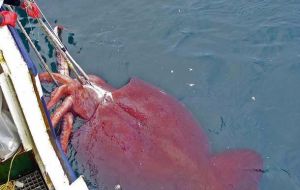MercoPress. South Atlantic News Agency
N Zealand scientists begin working on rare colossal squid

Technicians in New Zealand are set to begin defrosting a rare colossal squid. Having removed the creature from the freezer on Sunday, the team realized it would defrost too early for a planned examination by scientists on Wednesday, reports BBC.
They now aim to begin operations at 1500 (0300 GMT) in Wellington.
Very little is known about colossal squid, which can grow up to about 15meters long and appear to live largely in the cold Antarctic waters. The squid being examined at the Museum of New Zealand Te Papa centre is about 10 meters long and weighs about half a ton. "We removed the colossal squid from the freezer and took it out of its plastic container bin" explained Te Papa's Chris Paulin on the museum's squid blog. "We discovered that the specimen filled the entire bin, and therefore there is very little ice surrounding it. Consequently the specimen would thaw well before Wednesday." The Mesonychoteuthis hamiltonispecimen was caught in February 2007 in Antarctic waters. The colossal squid is remarkable for its size, but also for how rarely it has been sighted. It was identified first in 1925 from two tentacles found in a sperm whale's stomach. These deep-diving toothed whales regularly do battle with Mesonychoteuthis and other giant cephalopods such as the giant squid of the Architeuthisgenus. Since 1925, only a few Mesonychoteuthishave been sighted, all in the seas around Antarctica. Very little is known about how and where they live. The one certainty is that they are fearsome opponents, with big beaks and unique swiveling hooks on the club-like ends of their tentacles. One of the first tasks is likely to be ascertaining the squid's gender. This one is believed to be male; and females are thought to grow larger than males. So if this one is a he, presumably there are even bigger and heavier shes somewhere in the cold Antarctic waters. The Te Papa scientists are also defrosting a smaller, damaged colossal squid specimen, and two giant squid. The defrosting and dissection will be shown in a live web cast. Later in the week, scientists are expected to give public lectures about their initial results. Once thawed and examined, the squid will be embalmed and preserved.




Top Comments
Disclaimer & comment rulesCommenting for this story is now closed.
If you have a Facebook account, become a fan and comment on our Facebook Page!